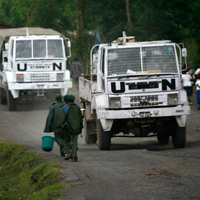
At rare moments during the course of a war, a confluence of factors come together to provide a window of opportunity for real conflict transformation. Now Congo has a unique opportunity to bring an end to more than 125 years of having its people and resources pillaged by colonial powers, international traders, neighbors, and foreign and domestic armed groups. Growing international attention to atrocities in Congo, both recent and historical, and widespread interest in conflict minerals has shined a spotlight on eastern Congo as it has never done before—from the U.S. Congress, from regional heads of state, and from multinational companies. This has opened a significant new window for policy reform and it is time for the U.S. government and Secretary of State Hillary Clinton to help leverage the end of the war in eastern Congo through leadership on two of the issues that will catalyze a broader solution to the cycles of violence there: minerals certification and comprehensive army reform.
Consumers and human rights activists in America and around the world are saying “Enough is Enough” of the killing, raping, and smuggling that has helped to satisfy our demand for cheaper cell phones, laptops, and other products powered in part by conflict minerals from the Congo. The result is congressional legislation—signed by President Obama—that requires real transparency from those companies profiting from this exploitation.[ii] That message has echoed from the board rooms of multinational companies to the presidential palaces of Central African leaders, right down to the rank and file of the rebel groups and army units that feed off of the war.
I’ve spoken with the CEOs of electronics companies, the leaders of Central African nations, mineral exporters and traders, mine owners, miners and their families, survivors of some of Congo’s worst violence, U.N. peacekeepers, Congolese civil society groups, and even some of the armed warlords. The new U.S. law on conflict minerals and the growing global campaign have shaken up the supply chain, and all those that are profiting say they are willing to change.
President Joseph Kabila of Congo has imposed a temporary export ban on minerals from the three main provinces in the war zone to clamp down on what he calls “a kind of mafia involved in minerals exploitation.” President Paul Kagame of Rwanda indicated his support for a mineral certification program, asking me repeatedly, “Who would oppose this?” A major electronics company CEO has shown me how he is personally investing his company in tracing and auditing its supply chain for products like cell phones and laptops to ensure that they are conflict-free. The traders and exporters are screaming about a possible embargo and are forwarding proposals of their own, including full audits of their supply chain right down to the tunnel manager at the mine. As one major regional mineral exporter proclaimed to me, “The American bill has stopped everyone in their tracks and made us realize that there has to be change, and it has to start at the top.”
The next six months will be a dangerous moment for people in Congo, as the horrific gang-rape of nearly 250 women in the mineral-rich area of Walikale in early August shows. But the response of President Kabila and the high-level attention to the region also gives all key actors an enormous opportunity to make the fundamental changes that need to be made to end the war. The message has been sent that the status quo on conflict minerals is unacceptable and the profits purchased with so much Congolese blood are at risk. If we miss the window for change now, these incidents will only get worse. But if we seize this moment and help shake up the system, conflict minerals and the war will become things of the past. This is Congo’s Enough Moment.
[i] I traveled throughout Eastern Congo with Ashley Judd during late August and early September 2010, along with Enough researchers Noel Atama and Fidel Bafilemba. All of the interviews and quotes referenced in this report come from that trip.
[ii] Section 1502 of the Dodd-Frank Wall Street Reform Bill, which was signed into law by President Obama in July 2010, requires all manufacturing companies listed on U.S. stock exchanges to trace and audit their supply chains for tin, tungsten, tantalum, and gold sourced from Congo and its adjoining countries to ensure that the minerals did not come from mines or trading routes controlled by armed groups.

